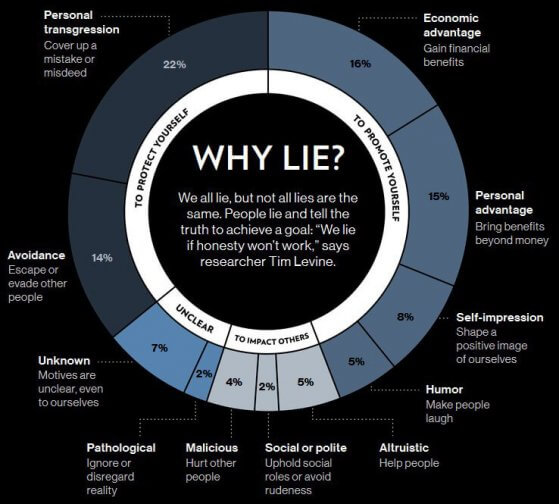Lie – an intentionally false statement.
No lie, you are being lied to as many as 200 times a day.[1] You will also contribute an average of 2 lies per day to the world, assuming you are truthful about it.[2]
Whether you tell a lie to protect another or to be more agreeable, each lie told will uniquely affect your mind. It will create conflict between the lie and the truth you hold to keep the lie in place. And since the mind controls the body, conflict within the mind will eventually manifest as conflict within the body.
Whew, this got deep really fast.
What if “the truth will set you free” is not just one of those catchy sayings to get a liar to suddenly become truthful? What if this phrase is a blueprint to healing your body?
This truth is what we will uncover in this article. By the end, you will know if you have been sabotaging yourself with lies, incorporating wishful thinking, or trapped so deep in a world where the truth and the lies are indistinguishable.
How The Brain Processes Lies
In 2016, Nature Neuroscience published a study showing that whenever people utter words of dishonesty, there is a burst of activity in their amygdala. The amygdala is responsible for producing anxiety, fear, and feelings of guilt within the body. 🤔 Very interesting.
So if lies do this much damage, then why do people keep telling them?
The answer lies within the same study.
The scientists had the participants play a game where they would win money by being deceptive. What was fascinating is that in this scenario, the emotional responses in the amygdala decreased.
However, the effects remained present in the body.
So why lie?
Why People Lie
To understand if lying has any benefits, you first need to recognize why you lie at all.
All the lies ever told can be fit into four categories as outlined by this article by National Geographic.

Chart by National Geographic
- Promoting Yourself (44%)
- For a financial benefit (16%)
- For a non-financial benefit (15%)
- Creating a better self-image (8%)
- Appearing humorous (5%)
- Protecting Yourself (36%)
- Covering a mistake or misdeed (22%)
- Avoiding others (14%)
- Impacting Others (11%)
- Helping others (5%)
- Hurting others (4%)
- Being polite (2%)
- Unclear (9%)
- Don’t even know why you’re lying while lying (7%)
- Are deemed as a pathological liar (2%)
Let’s break these down.
What does this all mean?
Looking at the first two on the list, 80% of the lies you tell come from believing one of two things. Either that you are not enough as you are or what you are can be lost.
There would be no purpose in promoting yourself or protecting yourself otherwise.
As one who is promoting himself, even within this article, this is a helpful reminder.
See also The 5 Ways Your Mind Betrays You.
Telling lies for any of these reasons reinforces your belief in your inadequacy, creating the circumstances for you to continue to lie.
Each one feeds itself in a perfect loop. You feel inadequate because you lie, yet you lie because you feel inadequate.
Another 11% of lies comes from wanting to impact others.
If you can impact others, then others can impact you. So the truths or lies you tell may not be of your own doing. They may have been pressed upon you by others.
The last 9% states that the reasons are unclear.
Since repeated actions become automatic over time, perhaps these lies are told out of habit.
What exactly is the truth and what is a lie?
Here is where it gets a little complicated. Your mind does not always know the difference between the truth and a lie.
Two opposing thoughts or statements can have the same effect on you. For example, look at the following phrases:
- People are awesome.
- People suck.
You have probably said both of these at one point. And both times, you meant it.
Yet neither declaration can be classified as the truth or a lie.
One causes you to be comfortable around people, and the other leads to you keeping your distance.
You were affected by both as if both were true.
No longer does validity matter. What matters is if the statement aligns with what you are and who you want to be.
By knowingly telling a lie, you are inviting conflict into your body.
Will unknowingly telling a lie do the same?
Healing the body with words
For hundreds of years, maybe more, patients have healed as a result of the placebo effect. The placebo effect is when a fake treatment is given to a patient, and this treatment leads to the patient’s healing.
One could argue that lies heal patients.
French psychologist Émile Coué introduced popular psychotherapy now called autosuggestion.
Autosuggestion is a self-induced suggestion (affirmation) in which you guide your own thoughts, feelings, or behavior. Instead of being affected by the words of others, you consciously pre-determine what to think.
For example, Émile Coué had his patients repeat many times a day, “Every day in every way I am getting better and better.”
Notice the careful wording of the above phrase. It prompts your mind to search for and find ways that you are getting better and better.
Naturally, the body follows what the mind tells it.
Since this is not a lie, there is no conflict. Or so it would seem.
If your previous thoughts were aligned with getting worse and worse each day, this new belief would oppose it.
There would be conflict, but only for a short time until your thoughts are singular in purpose.
Once the idea of health is fully accepted for yourself, you will be healthy.
So now truthfulness becomes an entirely different thing. No longer does it look upon a statement’s validity, truthfulness becomes how true you are to what you want in life.
Some examples would be:
- If you want health, but you are worried about and focused on ill-health, germs, diseases, etc.
- If you want to be pain-free, yet you disagree openly with others and verbally attack those with opposing views.
Any opposing thought will attempt to undo what the same mind created.
How To Accept Truthfulness For Yourself
I will point out 3 ways to go about this.
The first and easiest is using autosuggestion.
Set up your environment so that:
- Nothing reflects the life you don’t want
- Everything reflects the life you do want
This includes the websites you visit and the music you listen to.
Don’t worry about removing people from your life right now. That would just create more conflict.
Another way is to quiet your thoughts so that you don’t think them as much.
This is contrary to popular belief. Many believe that thinking is both healthy and needed.
It is not. When your thoughts aren’t present to distort reality, you will see things as they truly are, instead of how you’ve imagined them.
What is special about my album IAMNOBODY, IAMSOMEONE is that it does both for you.
It helps you to undo the illusionary thoughts that are present in your mind and it fills your mind with true, conflict-free ones. You could go from depressed to overjoyed in a matter of minutes with little effort on your part.
Order IAMNOBODY, IAMSOMEONE now!
The third way to accept truthfulness for yourself is to share the thoughts you want with everyone you come in contact with. The more people that share your thoughts with, the more these thoughts will be reflected everywhere you look.
When your thoughts and vision are not in competition with one another, you will know a peace so deep that it could heal the world.
